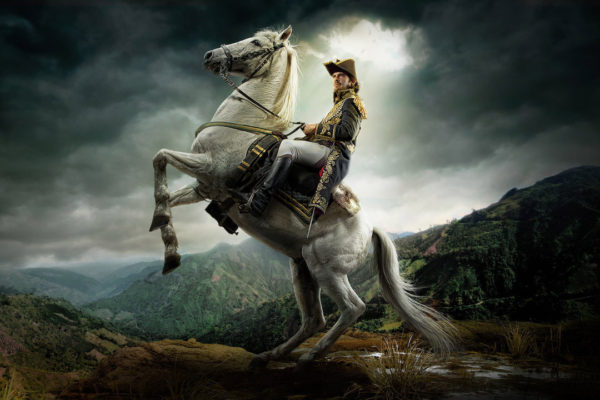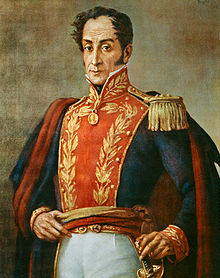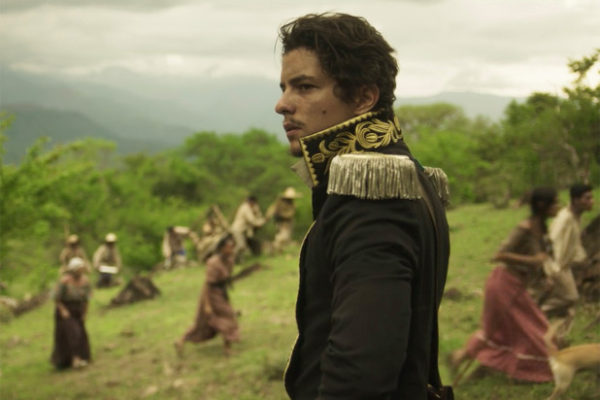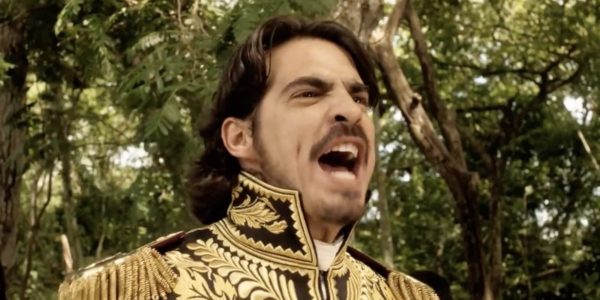
Flipping through Netflix’s menu, I came upon Bolivar, the 60-part Colombian television series whose logo is illustrated by a heroic image of Simon Bolivar clad in a fancy dress uniform and sitting astride a white horse with its front feet kicked up in mid-air. Being somewhat familiar with his credentials as an ardent Venezuelan nationalist who played an instrumental role in the expulsion of Spanish colonial forces from a bevy of South American countries, I tuned in to the first episode.
I was immediately drawn to several elements — the fairly exotic locales, the exquisitely-designed costumes, the richly diverse cast of characters and, of course, the rambunctious and inquisitive boy who would grow up to be a legend in his own time.

Bolivar, who lived from 1783 until 1830, was a historical figure of the first rank, more or less equal in stature, I would venture to say, to Giuseppe Mazzini, the unifier of Italy, and George Washington, the first president of the United States.
An idealist from a wealthy family who gave up a moneyed life of ease to lead the patriotic struggle against Spain, the land of his ancestors, he created Gran Colombia, a federation consisting of Colombia, Venezuela, Peru, Ecuador and Panama, and was its president from 1819 until his untimely death. In forming Gran Colombia, he fought hundreds of battles, fearlessly riding into the thick of them on horseback.
Much to his disappointment, the union crumbled, shattering his dream of a Latin American version of the United States. Although he was a beloved figure in many quarters, widely known as The Liberator, his enemies sought to bring him down. In 1828, a cabal of assassins tried to kill Bolivar, but the plot was thwarted by his mistress and fellow revolutionary, Manuela Saenz. Irrevocably disillusioned by the abject turn of events, he resigned and decided to go into exile with her.
Alas, the grim reaper caught up with Bolivar, who had contracted tuberculosis. He died while en route to board a ship bound for Europe.
Filmed in Colombia and Spain, Bolivar is a sweeping drama with fine production values, though I cannot vouch for its historical accuracy. Much of it revolves around Bolivar’s development as a charismatic leader and canny politician promoting and fighting for a fervent cause. Yet a good part of it delves into his red-hot romance with Saenz, a high-spirited person who was his lover, muse and advisor.
The young Bolivar, played to perfection by Jose Ramon Barreto, is portrayed as curious, intelligent and volatile. Kind to his African slaves, whom he wishes to free, Bolivar is devastated by the passing of his mother. He lives on a vast estate near the Venezuelan capital, Caracas, but leaves its smooth running to his brother, whose mulatto mistress raises eyebrows in society. Bolivar’s wise teacher, Simon Rodriquez (Ernesto Benjumea), broadens his knowledge and horizons.
He continues his education in Spain, where he meets Maria Teresa (Irene Esser), the ravishingly beautiful daughter of a Venezuelan-born aristocrat. Bolivar is madly in love with her, but Teresa’s father views their passionate courtship with a jaundiced eye.

Upon his return to Caracas, Bolivar plunges headlong into the battle for Venezuelan independence. The country is governed by a corrupt and venal clique whose assets are plundered by the Spanish crown. Bolivar is depicted as dedicated and visionary. Saenz comes across as a feisty and rebellious girl at this juncture. Years will elapse before she finally meets Bolivar, her hero. In the meantime, his crusade to eject the Spaniards rises and falls, forcing him to flee to Jamaica and, later, to travel to London to beg the British for military assistance.
A parade of minor and major characters, such as Bolivar’s sister, Maria Antonia, and her mentally declining husband, Pablo Clemente, appear and reappear in these segments.
The middle-aged Bolivar is played by Luis Geronimo Abreu, whose commanding presence rarely wanes. He is attended to by his loyal slave/brother/friend, Dinosio (Jefferson Quinones); his aide-de-camp O’Leary (Ed Hughes), a staid and reliable British army officer who measures his words and always wears a red uniform, and Sucre (the actor’s name is unlisted), a soft-spoken and brilliant general whom he treats like a son.

By now, Saenz (Shany Nadan) is unhappily married to James Thorne (Tim Janssen), a tall American physician who affects a white wig. It’s an arranged marriage, masterminded by her intrusive father. When Saenz is introduced to the dashing Bolivar at a ball, the sparks fly. Their sizzling affair is sexual in nature, but Bolivar is never less than impressed by Saenz’s perky, pesky personality and her acute analysis of people and events. Nadan shines as Saenz.

In a succession of graphic scenes, Bolivar and his motley crew of soldiers fight the elements as they confront the often inept Spaniards in pitched battles during which gory hand-to-hand combat takes place.
Bolivar’s association with one of his generals, Francisco de Paula Santander (Hans Martinez), gradually degenerates as they increasingly clash over what form of government would be appropriate for the new and imperilled republic. During this tense period, Bolivar alienates some of his supporters by naming himself as dictator.
As Bolivar reaches its sad and sorrowful denouement, The Liberator is faced by dissension and betrayal within the ranks, breakaway provinces demanding full independence, and yet more looming battles.
Bolivar, in short, is a mirror of his triumphs and tragedies.